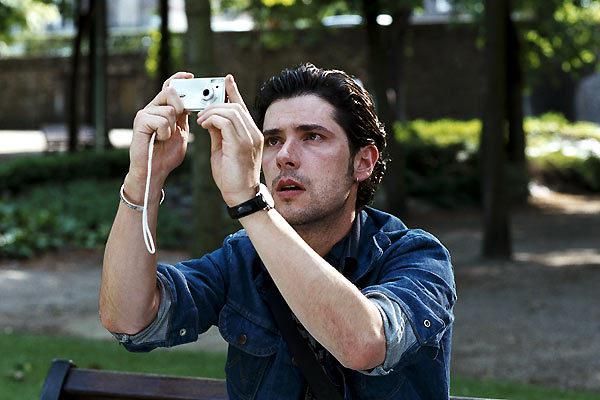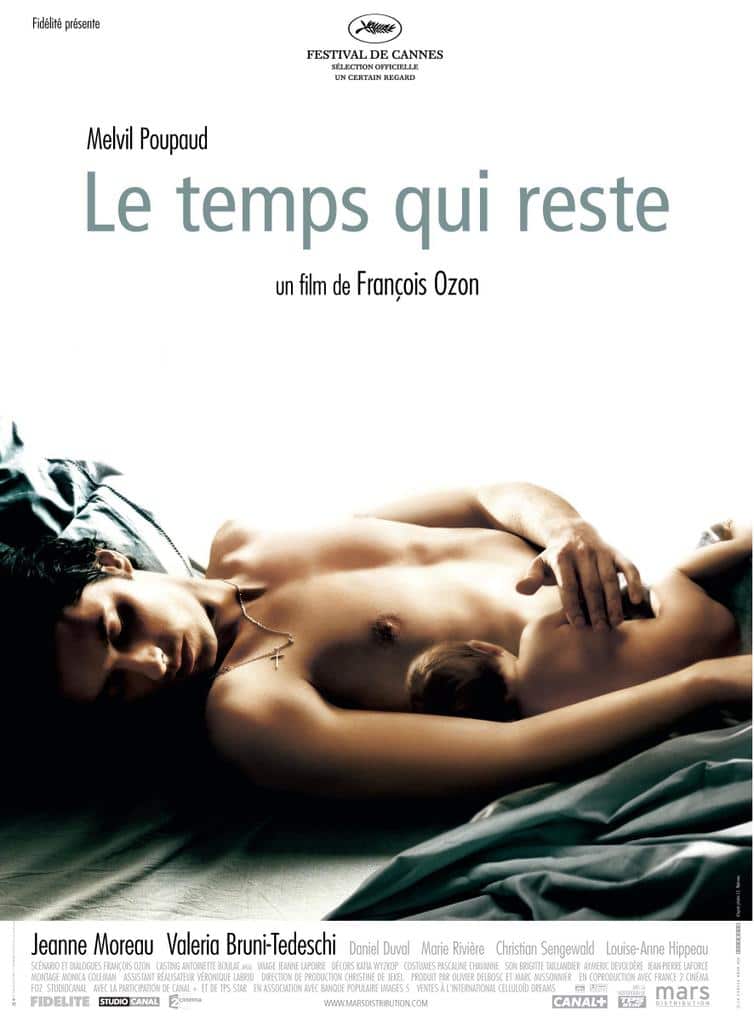Eye For Film >> Movies >> Time To Leave (2005) Film Review
Time To Leave
Reviewed by: Chris

Sometimes when I look at an old photo it's like pinching myself. It really happened. We really did that. It felt so good... Maybe recapturing childhood. Or closeness. Standing on a beach. Running towards the sea...
Where do we go inside when we remember? Is the 'meaning of life' in what we see and touch or in a place inside? It's a space that is the difference between physical closeness and intimacy. Between a special person and the rest of humanity. And when we connect with that place inside we see the world differently. See our lives differently.

Time to Leave opens with a young boy on a beach. He approaches the water. Then we cut to Romain as a successful fashion photographer. For a moment, he saw himself as a boy.
Cut again to Romain – he's 31 years old – being told he has inoperable cancer. He rehearses to himself how he is going to tell someone else. Instead, he finishes with his boyfriend and picks an argument with his sister. Romain finds solace with his grandmother Laura, played by Jeanne Moreau. "You're like me," he says. "You'll be dying soon."
Says Moreau: "To me, Time to Leave is a series of confessions about family relationships, the refusal to compromise, the refusal to bend to conventional ideas about how we can prevent our loved ones from suffering... In order to give love and receive love, you have to be in touch with pain, you have to be capable of provoking it and feeling it. When Romain leaves his grandmother, who represents love to him, it's like he's running away from their closeness, their potential osmosis. ... The fact that she says to him, 'Tonight, I'd like to slip away with you,' reveals that she is quite familiar with the idea of death, she's comfortable with it, though she's not encouraging it."
The emotional intimacy between Romain and his grandmother (they sleep in the same bed) is perhaps offset by the fact that he is gay. It reassures us that, however close they are, there is no suggestion of incest. Moreau gives depth and a sense of peace to the movie. She is already in her late 70's as she makes this movie. The veteran actress easily conveys a sense of being at peace with the idea of death, at peace with herself, at peace with her past, and yet still fascinated by life. "Death is an absolute mystery. We are all vulnerable to it - it's what makes life interesting and suspenseful. Life is extremely difficult, painful. People are always talking about happiness, but happiness - in French 'bonheur', like 'bonne heure' (literally the 'good hour') - boils down to chance. What matters are the joys - knowing how to feel cold, heat, shadows, light... Each person will interpret Time To Leave in their own way. Some will be frightened, some will reject it and others will discover things they never thought about before. I think this film is about more than death. There is a real calmness to it, a few tears, but no sentimentality."
Movies about dying often need a gimmick. Else they become maudlin waiting games. Time to Leave is not as upbeat as, say, The Diving Bell And The Butterfly, but it has a number of things that make it different. Some of them will repel mainstream audiences – strong, gay sexual scenes, for example. Not just between Romain and his lover, but more kinky stuff in the bowels of a sex club that recalls 'The Rectum' sex-club in Irreversible. Then there' s the fact that Romain finds the keys to his own epiphany in a skilfully handled threesome (and in which he hopefully impregnates a young waitress).
Time To Leave is at times laboured, but it is an intelligent film. It handles both familiar and unfamiliar emotions in a constructive, almost profound way. I say 'almost' as I'm not sure that it is quite as profound as we are tempted to believe. I felt Ozon's Swimming Pool (with Charlotte Rampling) told me more about the difficult process of writing a novel or screenplay than Time to Leave told me about the difficult process of death.
Romain's situation is unusual, so it is not easy to draw generalised conclusions. More than saying something about dying, Time to Leave maybe says something about life, the ties that bind, and the places we go to make sense of it all. The French title, Le Temps Qui Reste (The Time Which Remains), is probably more to the point than a 'Time to Leave.'
Reviewed on: 18 May 2008
















